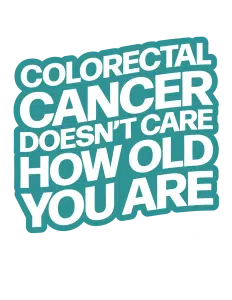
March is Colorectal Cancer Awareness Month, and this year, Colorectal Cancer Canada is putting a spotlight on the importance of screening with a national call to action: Screen at 45.
This March, we are encouraging all Canadians to start the conversation, learn the risks, recognize the symptoms, and make screening a priority. Because when it comes to colorectal cancer, early detection can save lives.

March is Colorectal Cancer Awareness Month…a time to take action! We are calling on health authorities across the country to lower the screening age to 45 to help detect cancer earlier and improve outcomes.
This month and every month, we also aim to raise awareness about the signs and symptoms of colorectal cancer and the importance of getting screened.
COLORECTAL CANCER CANADA
Colorectal Cancer Canada is the nation’s non-profit colorectal cancer patient organization. We are dedicated to colorectal cancer awareness and education, supporting patients and caregivers, and advocating on their behalf. Our goal is to reduce the incidence and mortality of colorectal cancer in Canada and to improve the quality of life for patients, their families and caregivers.


72
Canadians diagnosed every day

4th
Most commonly diagnosed cancer in Canada in 2025

90%
Curable when
diagnosed at early stages
COLORECTAL CANCER
SYMPTOMS
Become familiar with common colorectal cancer symptoms, such as unexplained changes to bowel habits, rectal bleeding, and abdominal pain and discomfort. If you notice any, be sure to inform your doctor as soon as possible. When caught early, colorectal cancer is highly treatable.
COLORECTAL CANCER
RISK FACTORS
Find out more about the factors that increase the chance of developing colorectal cancer. Knowing your risk factors and discussing them with your doctor can help you make more informed health care choices, such as participating in screening at an earlier age if necessary.

COLORECTAL CANCER
RISK FACTORS
Find out more about the factors that increase the chance of developing colorectal cancer. Knowing your risk factors and discussing them with your doctor can help you make more informed health care choices, such as participating in screening at an earlier age if necessary.
SCREENING AND
PREVENTION
Keeping up to date with colorectal cancer screening is an important part of prevention. A screening test checks for colorectal cancer when there are no signs and symptoms of the disease. Participating in screening helps to remove precancerous polyps and detect colorectal cancer at an earlier stage when it is more treatable.

SCREENING AND
PREVENTION
Keeping up to date with colorectal cancer screening is an important part of prevention. A screening test checks for colorectal cancer when there are no signs and symptoms of the disease. Participating in screening helps to remove precancerous polyps and detect colorectal cancer at an earlier stage when it is more treatable.
NEWLY DIAGNOSED WITH
COLORECTAL CANCER?
We’ve been there, and we are here to help you every step of the way. It is important to begin by gathering the resources you need to be your best advocate. There have been many new advances in colorectal cancer patient care – we want you to be aware of the latest information.

NEWLY DIAGNOSED WITH
COLORECTAL CANCER?
We’ve been there, and we are here to help you every step of the way. It is important to begin by gathering the resources you need to be your best advocate. There have been many new advances in colorectal cancer patient care – we want you to be aware of the latest information.
LATEST NEWS

A new clinical trial is studying whether a combination of two immunotherapy drugs -botensilimab and balstilimab- can help people with advanced microsatellite stable (MSS) colorectal cancer live longer and improve their quality of life. This study is for people whose colorectal cancer: Is MSS Cannot be removed by surgery Has progressed after all currently ...

January 2026 Some individuals with metastatic colorectal cancer have a specific genetic change called BRAF V600E. This mutation is linked to faster-growing cancer and has traditionally been harder to treat. Researchers are working to find better first-line (initial) treatment options for this group of patients. The study New findings from the BREAKWATER ...

January 2026 Results from the International ColoCare Study were presented at this year’s ASCO GI Symposium and found that greater levels of physical activity in the first 2 years after a colorectal cancer (CRC) diagnosis were linked to reduced cancer-related fatigue and improved quality of life in patients with non-metastatic CRC. ...









































